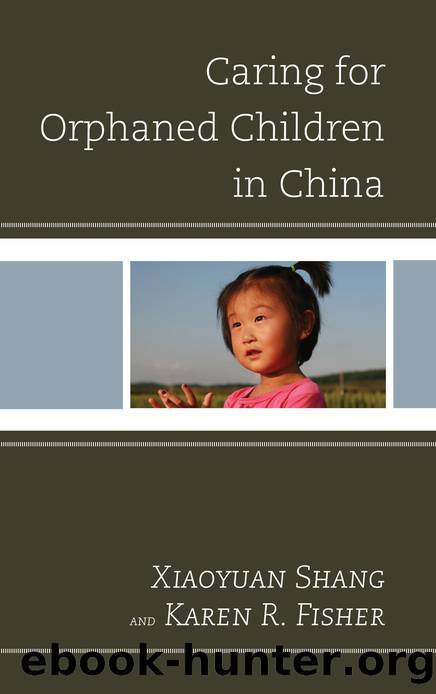Caring for Orphaned Children in China by Xiaoyuan Shang;Fisher Karen R.; & Karen R. Fisher

Author:Xiaoyuan, Shang;Fisher, Karen R.; & Karen R. Fisher
Language: eng
Format: epub
ISBN: 9780739136966
Publisher: Lexington Books/Fortress Academic
Published: 2013-12-05T00:00:00+00:00
Due to the kinship care traditions discussed in this chapter, the effect of fathersâ deaths was that many mothers were unable to continue caring for their children (61 percent). Most children without a father still had a mother but the community traditions placed the obligation for caring for the child on the paternal extended family as if they were orphans. These paternal families regarded children as members of the extended paternal family and community. When a woman was married in rural China she moved to her husbandâs home and village (Shang 2008a; Yan 2005). If the widowed mother chose to care for her children, she could face economic and social difficulties because the husbandâs extended family was obliged to support the orphaned children but not her.
These mothers were forced into the position where they could not afford to stay with their children after the death or departure of their husbands, because they did not have the economic means to support themselves and the extended family members were unwilling to include them in the parenting role. Therefore, some mothers had to leave their children, often by remarrying or through seeking migrant work in cities. Their children were then left behind with the extended paternal family and treated as orphans, consistent with the findings of a case study in 2004 (chapter 10; Shang 2008a). This new large sample fieldwork confirmed that it was not an isolated phenomenon, but could be generalized to other parts of China.
Children, boys in particular, belonged to the fatherâs family. If a father died, the families did not allow mothers to move away with a boy. The effect was that children whose fathers died and were cared for by paternal relatives could lose their right to live with their mother. In contrast, fathers whose wives died usually continued to bring up their children because a motherâs death did not affect the paternal extended family membership status of fathers and their children.
In the research villages, many children were orphaned when their fathers died and their mothers had to leave. In some villages, when the researchers asked to interview a single mother about her living situation and willingness to look after her children alone, the villagers said it was too difficult to find a widowed single mother because, in these villages, most widowed mothers remarried and left their children within one year of becoming widowed.
The villagers gave two explanations for mothers leaving. First, some men in these impoverished areas illegally bought wives who were forced into marriage. When the husbands died, these widows took the chance to leave and did not return. More commonly, many widowed mothers experienced extreme economic pressure forcing them to leave. Widowed mothers were not entitled to land or other property after their husbands died. If they did not receive support from the extended paternal family, they had no access to money or assets in the household and they could not undertake the heavy agricultural work and child-raising alone. Without the economic means to support themselves or their children, they were forced to remarry in other areas to form new economic relationships.
Download
This site does not store any files on its server. We only index and link to content provided by other sites. Please contact the content providers to delete copyright contents if any and email us, we'll remove relevant links or contents immediately.
| Anthropology | Archaeology |
| Philosophy | Politics & Government |
| Social Sciences | Sociology |
| Women's Studies |
The Secret History by Donna Tartt(18252)
The Social Justice Warrior Handbook by Lisa De Pasquale(11967)
Thirteen Reasons Why by Jay Asher(8484)
This Is How You Lose Her by Junot Diaz(6468)
Weapons of Math Destruction by Cathy O'Neil(5865)
Zero to One by Peter Thiel(5513)
Beartown by Fredrik Backman(5376)
The Myth of the Strong Leader by Archie Brown(5252)
The Fire Next Time by James Baldwin(5036)
How Democracies Die by Steven Levitsky & Daniel Ziblatt(4973)
Promise Me, Dad by Joe Biden(4917)
Stone's Rules by Roger Stone(4876)
100 Deadly Skills by Clint Emerson(4707)
A Higher Loyalty: Truth, Lies, and Leadership by James Comey(4569)
Rise and Kill First by Ronen Bergman(4556)
Secrecy World by Jake Bernstein(4413)
The David Icke Guide to the Global Conspiracy (and how to end it) by David Icke(4406)
The Farm by Tom Rob Smith(4335)
The Doomsday Machine by Daniel Ellsberg(4256)
